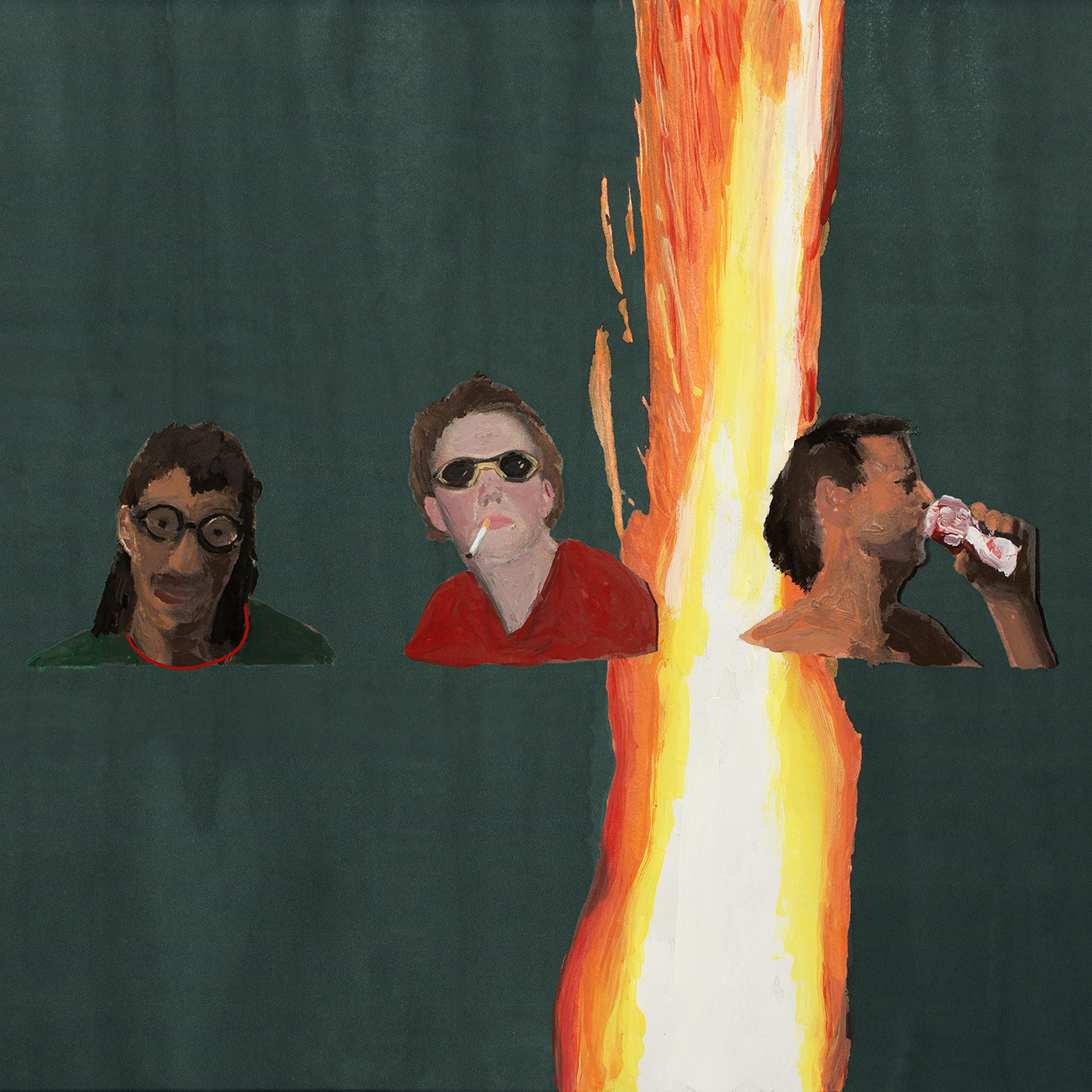
Manning Fireworks
—
Out September 06, 2024
—
ANTI-



No one paid too much attention when Jake Lenderman recorded Boat Songs, his third album released under his initials, MJ Lenderman. Before he cut it, after all, he was a 20-year-old guitarist working at an ice cream shop in his mountain hometown of Asheville, North Carolina, getting away for self-booked tours of his own songs or with the band he’d recently joined, Wednesday, whenever possible.
But as the pandemic took hold just as he turned 21, Lenderman—then making more money through state unemployment than he had ever serving scoops—enjoyed the sudden luxury of free time. Every day, he would read, paint, and write; every night, he and his roommates, bandmates, and best friends would drink and jam in their catawampus rental home, singing whatever came to mind over their collective racket. Some of those lines stuck around the next morning, slowly becoming 2021’s self-made Ghost of Your Guitar Solo and then 2022’s Boat Songs, recorded in a proper studio for a grand. With its barbed little jokes, canny sports references, and gloriously ragged guitar solos, Boat Songs became one of that year’s biggest breakthroughs, a ramshackle set of charms and chuckles. Much the same happened for Wednesday. Suddenly, people were paying a lot of attention to what Jake Lenderman might make next.
The answer is Manning Fireworks, recorded at Asheville’s Drop of Sun during multiple four-day stints whenever Lenderman had a break from the road. Coproducing it with pal and frequent collaborator Alex Farrar, Lenderman plays nearly every instrument here. It is not only his fourth full-length and studio debut for ANTI- but also a remarkable development in his story as an incredibly incisive singer-songwriter, whose propensity for humor always points to some uneasy, disorienting darkness. He wrote and made it with full awareness of the gaze Boat Songs had generated, how people now expected something great. Rather than wither, however, Lenderman used that pressure to ask himself what kind of musician he wanted to be—the funny cynic in the corner forever ready with a riposte or barbed bon mot, or one who could sort through his sea of cultural jetsam and one-liners to say something real about himself and his world, to figure out how he fits into all this mess?
He chose, of course, the latter. As a result, Manning Fireworks is an instant classic of an LP, his frank introspection and observation finding the intersection of wit and sadness and taking up residence there for 39 minutes. Yes, the punchlines are still here, as are the rusted-wire guitar solos that have made Lenderman a favorite for indie rock fans looking for an emerging guitar hero. (Speaking of solos, did you hear him leading his totally righteous band, the Wind, on his lauded live cassette last year? Wow.) But there’s a new sincerity, too, as Lenderman lets listeners clearly see the world through his warped lens, perhaps for the first time. “Please don’t laugh,” he deadpans during “Joker Lips,” a magnetic song about feeling pushed out by everyone else. “Only half of what I said was a joke.” Maybe you hear a tremble in his voice? That’s the frown behind the mask, finally slipping from Lenderman’s face.
Perhaps it’s a good moment, then, to tell you more about Lenderman, as a person. Though he is in fact a basketball zealot from North Carolina (and a former two guard who once dropped 10 threes in a game), MJ is not a reference to Michael Jordan. His name is actually Mark Jacob Lenderman. His parents are heads who were going to Bonnaroo when he was a baby and, as he admits, know more about modern music than he does. The second-to-youngest in a family of six, he was a childhood altar boy who went to Catholic school until he begged to go to public school to join the music program. Guitar Hero changed his life, leading him to obsessions with Jimi Hendrix and The Smashing Pumpkins. He began recording himself on his mom’s laptop in fifth grade after discovering My Morning Jacket’s roughshod early works, those lo-fi transmissions serving as some DIY semaphore. The lyrics started to come when he was a teenager.
Those lyrics finally come into sharp focus on Manning Fireworks, where the poetic clarity of William Carlos Williams and the economy of Raymond Carver meet the striking imagery of Harry Crews. Simply witness the opening title track, where an arresting first glimpse of a bird succumbing to a windstorm yields to criticisms of performative religious virtue, crass opportunism, and people who get just plain mean. Or there’s the way, during “Rudolph,” Lenderman uses an imagined scene of Lightning McQueen (yes, the smiling speedy from Cars) mowing down a doe to wonder, flatly, “How many roads must a man walk down ’til he learns he’s just a jerk?”
During the instantly addictive “Wristwatch,” it’s hard to tell if that jerk is Lenderman or someone else that’s too proud of what they have to be humble about what they’ve forsaken. Indeed, there is self-doubt, world weariness, worry, and alcoholism here, conditions rendered with a clarity and care that make these songs feel like short films. None of this is esoteric or obscure, either; Lenderman simply offers everyday anxieties and enthusiasms in uncanny ways.
If that all reads heavy, it actually sounds quite light on Manning Fireworks, sadness and shame routed through guitars that echo the sparkle of R.E.M. and the insistence of Drive-By Truckers, both fellow Southern greats. A half-sneering portrait of a dad cheating his way through a midlife crisis, at least until he gets caught and blasts Clapton in a rented Ferrari en route to Vegas, “She’s Leaving You” is the perfect shout-along anthem for any kid who’s ever felt shortchanged by their parents. The great “On My Knees” suggests a more efficient Crazy Horse, Lenderman’s voice cracking over sawtooth electric guitar as he wonders what it means to have fun in a world where so many people seem so full of shit. Even “You Don’t Know the Shape I’m In”—a bummer acoustic blues bouncing first over a drum machine and then a brushed snare, with Lenderman’s voice traced by Karly Hartzman—feels happy to be here, sorting through these existential questions we’re lucky enough to have. There is an abiding sadness to Manning Fireworks, but it feels friendly and familiar, the kind of troubles you’ve always known.
No, no one paid too much attention to Lenderman when he was recording Boat Songs. And for a while there, the amount of attention he was getting as he made Manning Fireworks got in his head. But on the finale, “Bark at the Moon,” he is back in his childhood bedroom in a sleepy mountain tourist town, swearing off big cities or changing himself to suit anyone’s expectations. Instead, he’s playing Guitar Hero until the wee hours, a kid falling in love with rock music all over again. He lets out a playful howl, like the beast in that Ozzy hit. He and his friends then disappear for the next seven minutes, his guitar solo subsumed in a roaring drone that recalls the righteous Sonic Youth records that Lenderman loves, the ones made soon after he was born. It’s a joyous escape and an important moment. Lenderman is still sorting through the kinds of songs he wants to write and remembering they can go anywhere he wants—much like they did back at those late-night house jams, no matter who is now looking.